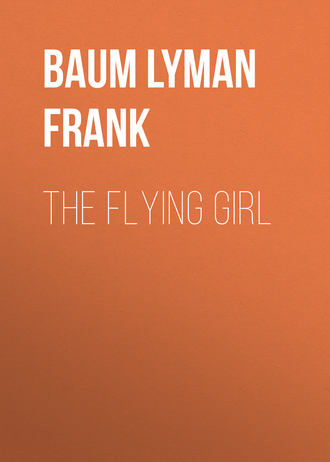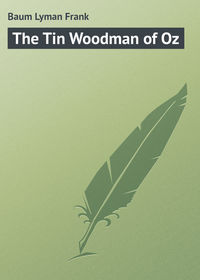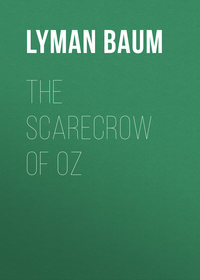 полная версия
полная версияThe Flying Girl
Steve’s expenses were growing greater, however, and Orissa began figuring on “ways and means.” Their life in this retired place was so simple that she believed her mother could do without the maid and questioned her on the subject. Mrs. Kane declared she preferred to be alone, if Orissa felt she could prepare the breakfasts and dinners unaided. Luncheons at home were very plain affairs and Steve readily agreed to come into the house at noon and get a bite for himself and his mother. So the maid was dismissed and a considerable expense eliminated.
During the summer construction of the airship progressed more rapidly and, after the motors were completed and tested and found to be nearly perfect, Steve began to model the planes and perfect his automatic balance.
It was hard work sometimes for Orissa to sit in the office and keep her mind on her work when she knew her brother was completing or testing some important detail of the aëroplane, but she held herself in rigid restraint and succeeded in giving satisfaction to her employer.
On the August afternoon on which our story opens Stephen Kane was to begin the final assembling of the parts of his machine, after which he could test it in real flight. He needed Orissa’s assistance to help him handle some of the huge ribbed planes, and so she had promised to come home early.
It was not long before she entered the hangar, arrayed in her old gingham, which allowed her to move freely. The two became so interested that Mrs. Kane almost missed her dinner in spite of the girl’s promise; but Orissa did manage to tear herself away from the fascinating task long enough to prepare the meal and serve it. Steve came in and tried to eat, for he was at a point where he could do nothing without his sister’s help; but neither of them was able to swallow more than a morsel, and as quickly as possible hurried back to their work.
Mrs. Kane, although totally blind, knew her way about the house perfectly and was able to take care of herself in nearly all ways; so when bedtime came she abandoned her monotonous knitting, played a few pieces on the pianoforte – one of her few amusements – and then calmly retired for the night. She never worried over the “children,” believing they were competent to care for themselves.
It was long past midnight before Steve got to a point where he could continue without Orissa. “In about three days more,” he said, as they washed up and prepared to adjourn to the house, “I will be able to make my first flight. Shall we wait till Sunday, Ris, or will you take a day off?”
“Oh, not Sunday,” she replied. However eager her brother might be she had never yet allowed him to work a moment on a Sunday, and Steve deferred to her wishes in this regard. “We’re pretty busy at the office and Mr. Burthon was inclined to be a little cranky to-day; but I’ll manage it somehow, just as soon as you are ready.”
“What sort of a fellow is Burthon?” asked her brother, somewhat curiously.
“Why, he stands well in the business world, I’m told, and is very successful in handling large tracts of real estate,” she replied. “Also, he seems a gentleman by birth and breeding, yet a queerer man I never met. His chief peculiarity is in being very absent-minded, but he does other odd things. Yesterday he refused to sell a piece of land to a customer because he did not like him, and he told the man so with rude frankness. One day I discovered he had cheated another man out of six hundred dollars. I called his attention to what I described as a ‘mistake,’ and he said he robbed the man on purpose, because he had been snobbish and overbearing. He gave the six hundred dollars to a poor woman to build her a house with, saying to me that he had once committed a serious crime for which this was in part penance, and soon after he platted a lot of swamp land down near San Pedro and advertised it as ‘desirable residence property.’ Really, Steve, I can’t quite make out Mr. Burthon.”
“He seems to have good and bad points, from what you say,” observed her brother, “and I judge the two qualities are about evenly mixed. Is he nice to you, Ris?”
“He is always polite and respectful, but most of the time he doesn’t know I’m in existence. When he gets one of his absorbed fits his eyes look right through me, as if I wasn’t there.”
“Perhaps he is thinking out some big schemes. Is he a rich man?”
“He is said to be quite wealthy. But he is an old bachelor, and the girl across the hall says he lives at a club, goes to the theater every night and drinks more than is good for him. I hardly believe that last, Steve, for Mr. Burthon doesn’t look a bit like a drinking man.”
“Perhaps he’s a morphine fiend. That would make him absent-minded, you know.”
“No; when he’s aroused his head is clear as a bell and he drives a shrewd bargain. Do you know, Steve, I’m inclined to think that speech of his was in earnest, although he laughed harshly at the time, and that – that – ”
“That what?”
“That at some time or other he has committed some crime that worries him.”
CHAPTER IV
MR. BURTHON IS CONFIDENTIAL
Orissa was tired next day and she blundered several times in copying deeds and attending to the routine of the private office, where she alone was closeted with the proprietor. But Mr. Burthon would not have noticed had she set fire to the place, so intent was he upon a bundle of papers he had brought in with him and to which he devoted his exclusive attention.
The girl left him at his desk when she went to lunch and found him there, still occupied with the papers, when she returned. Several people wanted to see him personally, but he told Orissa to state he was engaged and could admit no one. She gave the message to the young man in charge of the outer office, where several clerks were employed, and they knew better than to allow anyone to invade Mr. Burthon’s private sanctum.
At about three o’clock, while she was busy at her desk, the secretary heard her name spoken and looked up. From his chair Mr. Burthon was eyeing her observantly. His gaze was clear and intelligent; the abstracted mood had passed.
“Come here, please, Miss Kane,” he said.
She brought her writing pad and sat down beside his desk, as she did when he dictated his letters; but he shook his head.
“We’ll not mind the mail to-day,” he said. “I want to talk with you; to advise with you. Queerly enough, Miss Kane, there isn’t a soul on earth in whom I can confide when occasion arises. In other words, I haven’t an intimate friend I can trust, or one who is sincerely interested in me.”
That embarrassed Orissa a little. Since she had been working at the office this was the first time he had addressed a remark to her not connected with the business. Indeed, the man was now regarding her much as he would a curiosity, as if he had just discovered her. She was amazed to hear him speak so confidentially and made no reply because she had nothing to say.
After a pause he continued:
“You haven’t much business experience, my child, but you have a keen intellect and decided opinions.” Orissa wondered how he knew that. “Therefore I am going to ask your advice in a matter where business is blended with sentiment. Will you be good enough to give me your candid opinion?”
“If you wish me to, sir,” she said, after some hesitation.
“Thank you, Miss Kane. The case is this: With four others I purchased some time ago a gold mine in Arizona known as the ‘Queen of Hearts.’ It cost me about all I am worth – some two hundred thousand dollars.”
Orissa gasped. It seemed an enormous sum. But he continued, speaking calmly and clearly:
“I thought at the time the mine was surely worth a million. I went to see it and found the ore exceedingly rich. The others, who purchased the Queen of Hearts with me, were equally deceived, for just recently we have discovered that the rich vein was either very narrow or was placed there by those we purchased from, with the intention of defrauding us. In either case, please understand that the mine is not worth a cotton hat. We are a stock company, and our stock is listed on the exchange and commands a high premium, for no one except the owners knows the truth about it. The general idea is that the mine is still producing largely – and it is – for, to protect ourselves until we can unload it on to others, we have secretly purchased rich ore elsewhere, dumped it into the mine, and then taken it out again.”
He paused, drumming absently on the desk with his fingers, and Orissa asked:
“What is the object of that deception, sir?”
“To maintain the public delusion until we can sell out. And now I come to the point of my story, Miss Kane. Gold mines, even as rich as the Queen of Hearts is reputed to be, are not easy to sell. I have exhausted all my resources in keeping up this deception and the time has come when I must sell or become bankrupt. The other stockholders have smaller interests and are wealthier men, but each one is striving hard to secure a customer. I have found one.”
He looked up and smiled at her; then he frowned.
“The man is my brother-in-law,” he added.
Orissa was getting nervous, but waited for him to continue.
“This brother-in-law is a man I detest. He married my only sister and did not treat her well. He is a notorious gambler and confidence man, although perhaps he would not admit that is his profession. At all events he had the assurance to sneer at me and abuse my sister, and I was powerless at the time to interfere. Fortunately the poor woman died several years ago. Since then I have not seen much of Cumberford, for he lives in the East. He came out here last month on some small business matter and has gone crazy over the Queen of Hearts mine. He hunted me up and asked if I’d sell part of my stock. I told him I would sell all or none. So he has been getting his money together and has raised two hundred and fifty thousand dollars – the sum I demanded.”
Orissa was looking at him wonderingly. The story seemed incredible. Perhaps Mr. Burthon saw the dismay and reproach in her eyes, for he asked:
“What do you think of this deal, Miss Kane? Am I not fortunate?”
“But – would you really sell a worthless property to this man – your own brother-in-law – and – and steal a fortune from him?” she inquired.
The man flushed and shifted uneasily in his seat.
“He abused my sister,” he said, as if defending himself.
“The property is worthless,” she persisted.
“He can hustle around and sell it again, as I am doing.”
“Suppose he fails? Suppose he refuses to do such a wicked thing?”
Mr. Burthon stared at her a moment. Then he laughed harshly.
“Cumberford would delight in such a ‘wicked’ game,” he replied. “And, if he failed to sell, the scoundrel would be ruined, for I believe this two hundred and fifty thousand is about all he’s worth.”
“It’s dreadful!” exclaimed the girl, really shocked.
“It is done every day in a business way,” he rejoined.
“Then why did you ask my advice?” demanded the girl, quickly. Before answering he waited to drum on the desk with his fingers again.
“Because,” said he, speaking slowly, “I dislike this man so passionately that I have wondered if the hatred blinds my judgment. He may be dangerous, too, yet I think he is too much of a fool to be able to injure me in retaliation. I don’t know him very well. I’ve not seen him before for years.” He paused, taking note of the horror spreading over the girl’s face. Then he smiled and added in a gentler voice: “Perhaps my chief reason, however, for seeking your advice is that I find I have still a conscience. Yes, yes; a troublesome conscience. I have been suppressing it for years, yet like Banquo’s ghost it will not down. My business judgment determines me to unload this worthless stock and save myself from the loss of my entire fortune. I must do it. It is like a man taking unawares a counterfeit coin, and then, discovering it is spurious, passing it on to some innocent victim. You might do that yourself, Miss Kane.”
“I do not believe I would.”
“Well, most people would, and think it no crime. In this case I’m merely passing a counterfeit, that I received innocently, on to another innocent. If the fact is ever known my business friends will applaud me. But that obstinate conscience of mine keeps asking the question: ‘Is it safe?’ It asserts that I am filled with glee because I am selling to a man I hate – a man who has indirectly injured me. I am to get revenge as well as save my money. Safe? Of course it’s safe. Yet my – er – conscience – the still small voice – keeps digging at me to be careful. It doesn’t seem to like the idea of dealing with Cumberford, and has been annoying me for several days. So I thought I would put the case to a young, pure-minded girl who has a clear head and is honest. I imagined you would tell me to go ahead. Then I could afford to laugh at cautious Mr. Conscience.”
“No,” said Orissa, gravely, “the conscience is right. But you misunderstand its warning. It doesn’t mean that the act is not safe from a worldly point of view, but from a moral standpoint. You could not respect yourself, Mr. Burthon, if you did this thing.”
He sighed and turned to his papers. Orissa hesitated. Then, impulsively, she asked:
“You won’t do it, sir; will you?”
“Yes, Miss Kane; I think I shall.”
His tone had changed. It was now hard and cold.
“Mr. Cumberford will call here to-morrow morning at nine, to consummate the deal,” he continued. “See that we are not disturbed, Miss Kane.”
“But, sir – ”
He turned upon her almost fiercely, but at sight of her distressed, downcast face a kindlier look came to his eyes.
“Remember that the alternative would be ruin,” he said gently. “I would be obliged to give up my business – these offices – and begin life anew. You would lose your position, and – ”
“Oh, I won’t mind that!” she exclaimed.
“Don’t you care for it, then?”
“Yes; for I need the money I earn. But to do right will not ruin either of us, sir.”
“Perhaps not; but I’m not going to do right – as you see it. I shall follow my business judgment.”
Orissa was indignant.
“I shall save you from yourself, then,” she cried, standing before him like an accusing angel. “I warn you now, Mr. Burthon, that when Mr. Cumberford calls I shall tell him the truth about your mine, and then he will not buy it.”
He looked at her curiously, reflectively, for a long time, as if he beheld for the first time some rare and admirable thing. The man was not angered. He seemed not even annoyed by her threat. But after that period of disconcerting study he turned again to his desk.
“Thank you, Miss Kane. That is all.”
She went back to her post, trembling nervously from the excitement of the interview, and tried to put her mind on her work. Mr. Burthon was wholly unemotional and seemed to have forgotten her presence. But, a half hour later, when he thrust the papers into his pocket, locked his desk and took his hat to go, he paused beside his secretary, gazed earnestly into her face a moment and then abruptly turned away.
“Good night, Miss Kane,” he said, and his voice seemed to dwell tenderly on her name.
CHAPTER V
BETWEEN MAN AND MAN – AND A GIRL
That night Orissa confided the whole story to Steve. Her brother listened thoughtfully and then inquired:
“Will you really warn Mr. Cumberford, Ris?”
“I – I ought to,” she faltered.
“Then do,” he returned. “To my notion Burthon is playing a mean trick on the fellow, and no good business man would either applaud or respect him for it. Your employer is shifty, Orissa; I’m sure of it; if I were you I’d put a stop to his game no matter what came of it.”
“Very well, Steve; I’ll do it. But I don’t believe Mr. Burthon means to be a bad man. His plea about his conscience proves that. But – but – ”
“It’s worse for a man to realize he’s doing wrong, and then do it, than if he were too hardened to have any conscience at all,” asserted Steve oracularly.
“And if I let him do this wrong act I would be as guilty as he,” she added.
“That’s true, Ris. You’ll lose your job, sure enough, but there will be another somewhere just as good.”
So, when Mr. Burthon’s secretary went to the office next morning she was keyed up to do the most heroic deed that had ever come to her hand. Whatever the consequences might be, the girl was determined to waylay Mr. Cumberford when he arrived and tell him the truth about the Queen of Hearts.
But he did not come to the office at nine o’clock. Neither had Mr. Burthon arrived at that time. Orissa, her heart beating with trepidation but strong in resolve, watched the clock nearing the hour, passing it, and steadily ticking on in the silence of the office. The outer room was busy this morning, and in the broker’s absence his secretary was called upon to perform many minor tasks; but her mind was more upon the clock than upon her work.
Ten o’clock came. Eleven. At half past eleven the door swung open and Mr. Burthon ushered in a strange gentleman whom Orissa at once decided was Mr. Cumberford. He was extremely tall and thin and stooped somewhat as he walked. He had a long, grizzled mustache, wore gold-rimmed eyeglasses and carried a gold-headed cane. From his patent leather shoes to his chamois gloves he was as neat and sleek as if about to attend a reception.
Observing the presence of a young lady the stranger at once removed his hat, showing his head to be perfectly bald.
“Sit down, Cumberford,” said Mr. Burthon, carelessly.
As he obeyed, Orissa, her face flaming red, advanced to a position before him and exclaimed in a pleading voice:
“Oh, sir, do not buy Mr. Burthon’s mine, I beg of you!”
The man stared at her with faded gray eyes which were enlarged by the lenses of his spectacles. Mr. Burthon smiled, seemed interested, and watched the scene with evident amusement.
“Why not, my child?” asked Mr. Cumberford.
“Because it is worthless – absolutely worthless!” she declared.
He turned to the other man.
“Eh, Burthon?” he muttered, inquiringly.
“Miss Kane believes she is speaking the truth,” said the broker jauntily.
“Oh, she does. And you, Burthon?”
“I? Why, I’m of the same opinion.”
Mr. Cumberford took out his handkerchief, removed his glasses and polished the lenses with a thoughtful air. Orissa was trembling with nervousness.
“Don’t buy the Queen of Hearts, sir; it would ruin you,” she repeated earnestly.
He breathed upon the glasses and wiped them carefully.
“You interest me,” he remarked. “But, the fact is, I – er – I’ve bought it.”
“Already!”
“At nine o’clock, according to agreement. Burthon sent word he’d come to my hotel instead of meeting me at his office, as first planned.”
“Oh, I see!” cried Orissa, much disappointed. “He knew I would prevent the crime.”
“Crime, miss?”
“Is it not a crime to rob you of two hundred and fifty thousand dollars?”
“It would be, of course. I should dislike to lose so much money.”
“You have lost it!” declared the girl. “That mine has no gold in it at all – except what has been bought elsewhere and placed in it to deceive a purchaser.”
Mr. Cumberford replaced his glasses, adjusting them carefully upon his nose. Then he stared at Orissa again.
“You’re an honest young woman,” he said calmly. “I’m much obliged. You interest me. But – ahem! – Burthon has my money, you see.”
Mr. Burthon’s expression had changed. He was now regarding his brother-in-law with a curious and puzzled gaze.
“You’re not angry, Cumberford?” he asked.
“No, Burthon.”
“You’re not even annoyed, I take it?” This with something of a sneer.
“No, Burthon.”
Both Orissa and her employer were amazed. Looking from one to another, Mr. Cumberford’s waxen features relaxed into a smile.
“I’ve placed my Queen of Hearts stock in a safety deposit vault,” he remarked blandly.
“I have deposited your money in my bank,” retorted Mr. Burthon, triumphantly.
“Excellent!” said the other. “The thing interests me – indeed it does. You couldn’t purchase that stock from me at this moment, Burthon, for twice the sum I paid you.”
“No? And why not?”
“I’ll tell you. I had not intended to refer to the matter just yet, but this young woman’s exposé of your attempted trickery induces me to explain matters. You have always taken me for a fool, Burthon.”
“I’ve tried to place a proper value on your intellect, Cumberford.”
“You have little talent in that line, believe me. Before I came out here I had heard such glowing reports of the Queen of Hearts that I stopped off in Arizona to see the wonderful mine. The manager was very polite and showed me about, but somehow I got a notion that all was not square and aboveboard. I’ve always been interested in mines; they fascinate me; and if this mine was as rich as reported I wanted some of the stock. But I imagined things looked a little queer, so I sent a confidential agent – fellow named Brewster, who has been with me for years – to hire out as a miner and keep his eyes open. He soon discovered the truth – that the mine was being ‘salted’ or fed with outside gold ore in precisely the way this girl has stated.”
He turned to Orissa with a profound bow, then looked toward Burthon again. “The thing interested me. I wondered why, and wired my man to stay on a little longer, till I had time to think it over. I – er – think very slowly. Very. In a few days Brewster telegraphed me the startling intelligence that the mine had actually struck a new lead, with ore far richer than the first showing, although that had made the Queen of Hearts famous. My man had been sent to the telegraph office with messages from the manager to Mr. Burthon and the four other stockholders; but poor Brewster’s memory is bad, and he forgot to send a telegram to anyone but me. Of course the great strike – er – interested me. I instructed Brewster over the telegraph wire. At a cost of five thousand dollars we bribed the manager to keep the valuable strike secret for ten days. He’s an honest man, and I shall retain him in the office. The ten days expire to-night. Meantime, I’ve purchased the stock.”
Mr. Burthon sprang to his feet, white with anger.
“You scoundrel!” he shouted.
“Don’t get excited, Burthon. This is a mere business incident, between man and man – and a girl.” Another bow toward Orissa. “You tried to rob me, sir, and sneered when you thought you had succeeded. I haven’t robbed you, for I paid your price; but I’ve made a very neat investment. My stock is worth a million at this moment. Interesting, isn’t it?”
Mr. Burthon recovered himself with an effort and sat down again.
“Very well,” he said a little thickly. “As you say, it’s all in the way of business. Good day, Cumberford.”
The other man arose and faced Orissa, who stood by wholly bewildered by this unexpected development.
“Thank you again, my child. Your name? Orissa Kane. I’ll remember it. You tried to do me a kindness. Interesting – very!”
Without another glance at Mr. Burthon he put on his hat, walked out and closed the door softly behind him.
Orissa looked up and found the broker’s eyes regarding her intently.
“I – I’m sorry, sir,” she stammered; “but I had to do it, to satisfy my conscience. I suppose I am dismissed?”
“No, indeed, Miss Kane,” he returned in kindly tones. “An honest secretary is too rare an acquisition to be dismissed without just cause. Having told you what I did, I could expect you to act in no other way.”
“And, after all, sir,” she said, brightening at the thought, “you did not rob him! Yet you saved your fortune.”
He made a slight grimace, and then laughed frankly.
“Had I taken your advice,” he rejoined, “I should now be worth a million.”
CHAPTER VI
A BUCKING BIPLANE
Stephen Kane had scarcely slept a wink for three nights. When Orissa came home Thursday evening he met her at the car with the news that his aëroplane was complete.
“I’ve been adjusting it and testing the working parts all the afternoon,” he said, his voice tense with effort to restrain his excitement, “and I’m ready for the trial whenever you say.”
“All right, Steve,” she replied briskly; “it begins to be daylight at about half past four, this time of year; shall we make the trial at that hour to-morrow morning?”
“I couldn’t wait longer than that,” he admitted, pressing her arm as they walked along. “My idea is to take it into old Marston’s pasture.”









